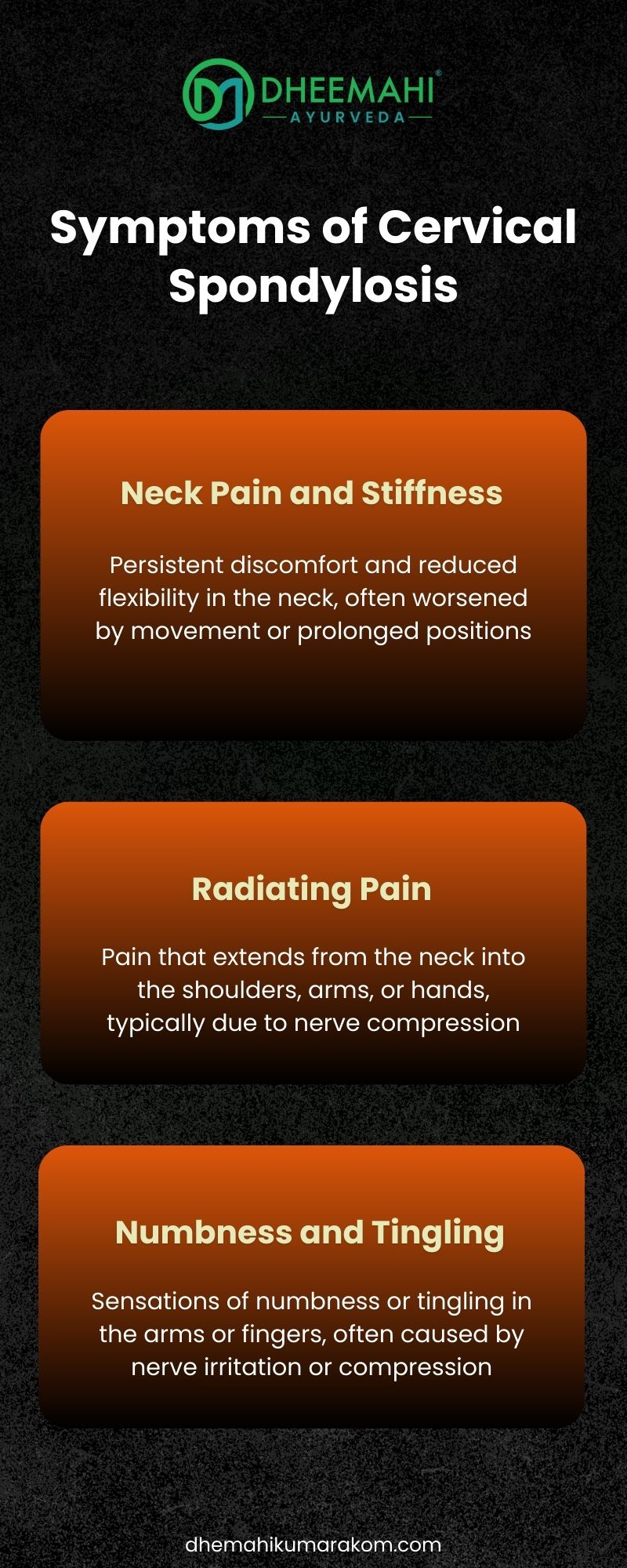Causes, Symptoms, and Prevention Techniques for Cervical Spondylosis in Ayurveda
Dr. Amritha B.A.M.S
Cervical spondylosis, commonly referred to as age-related degenerative changes in the cervical spine, is a prevalent condition that affects many individuals, particularly as they age. In Ayurveda, this condition is understood through the dosha imbalances and systemic degeneration.
Cervical spondylosis is primarily linked to Vata imbalance and the accumulation of ama. Understanding the causes, recognising the symptoms, and employing preventive techniques can significantly contribute to managing and reducing the risk of this condition. Individuals can maintain spinal health and overall well-being by embracing a balanced diet, regular exercise, proper posture, and Ayurvedic therapies.

Causes of Cervical Spondylosis
Cervical spondylosis, commonly known as cervical arthritis or degenerative neck disease, is characterised by age-related changes in the cervical spine. The primary causes of cervical spondylosis include:
Ageing: The natural ageing process leads to spinal disc degeneration, cartilage loss, and bone spur formation. These changes reduce the cushioning and flexibility of the cervical spine.
Disc Degeneration: Over time, the intervertebral discs between the vertebrae lose hydration and elasticity, causing them to shrink or herniate. This can lead to compression of nearby nerves and pain.
Bone Spurs: As the discs degenerate, the body may form bone spurs (osteophytes) to stabilise the spine. These spurs can impair nerves or the spinal cord, contributing to pain and stiffness.
Poor Posture: Prolonged poor posture, such as hunching over a desk or using electronic devices, can strain the cervical spine and accelerate degenerative changes. Being mindful of our posture can help prevent these degenerative changes.
Repetitive Strain: Repetitive neck movements or heavy lifting can stress the cervical spine, leading to wear and tear.
Genetic Factors: A family history of spinal disorders can increase the risk of developing cervical spondylosis, underscoring the importance of understanding your family’s medical history.
Injuries: Previous neck injuries or trauma can contribute to the development of cervical spondylosis by affecting the alignment and integrity of the cervical spine.
Symptoms of Cervical Spondylosis
Neck Pain and Stiffness: Persistent discomfort and reduced flexibility in the neck, often worsened by movement or prolonged positions.
Radiating Pain: Pain that extends from the neck into the shoulders, arms, or hands, typically due to nerve compression.
Numbness and Tingling: Sensations of numbness or tingling in the arms or fingers, often caused by nerve irritation or compression.
Headaches: Tension-type headaches originating from the neck and radiating towards the head.
Reduced Range of Motion: Difficulty moving the neck freely, impacting daily activities and movement.
Muscle Weakness: Decreased strength in the arms or hands can affect manual dexterity and grip strength.
Balance Issues: In advanced cases, problems with balance and coordination due to spinal cord compression
Prevention Cervical Spondylosis
Maintain Good Posture: Practice proper posture while sitting, standing, and working. Use ergonomic furniture and make adjustments to your workspace to support spinal alignment.
Exercise Regularly: Engage in exercises that strengthen the neck and back muscles, improve flexibility, and support overall spinal health. Activities like yoga and swimming are beneficial.
Use Proper Techniques: When lifting heavy objects, bend at the knees rather than the waist, and avoid twisting your spine.
Avoid Prolonged Strain: Take breaks and change positions regularly if you work at a desk or use electronic devices frequently to reduce strain on your neck.
Supportive Sleep Environment: Use a supportive pillow that maintains proper neck alignment and avoid sleeping in positions that strain the neck.
Stay Hydrated and Maintain a Balanced Diet: Proper hydration and a diet rich in nutrients can help keep the spinal discs healthy and support overall joint function.
Cervical Spondylosis Ayurvedic Treatment at Dheemahi Ayurveda
Dheemahi Ayurveda offers a holistic Ayurvedic approach to managing cervical spondylosis, focusing on personalized treatments to address the root causes of the condition. We begin with a thorough assessment of the patient’s doshic constitution and specific imbalances to create a customized treatment plan.
Our therapies include Abhyanga (oil massage) to improve circulation and reduce stiffness, Greeva Basti (neck therapy) to alleviate pain, and Nasya (nasal medication) to clear toxins from the head and neck region. Panchakarma detoxification, featuring treatments like Virechana and Basti, helps eliminate toxins and strengthen the musculoskeletal system.
With over 100 years of Ayurvedic expertise, Dheemahi Ayurveda provides a transformative healing experience, offering effective cervical spondylosis Ayurvedic treatment in Kerala. Experience authentic Ayurveda in a serene, nurturing environment and take a step towards pain-free living.
How Our Booking Process Works
The unique approach involves a series of discussion during your initial decision-making process to make sure that we will be able to match your expectations with our treatment.
Based on the discussions with you our team of expert doctors will design the best treatment package personalized for your needs.
01
Consultation Form
Fill out our consultation form, and let us know when will you be available for our doctor to talk to you
02
Discussion with Doctor
Discuss your health condition and expectations with our doctor.
03
Booking Confirmation
Confirm the booking by making a payment of 50% advance.
Consultation Form
Submit this form to initiate a booking with us
Have any queries? We will help you. Talk to us now
Say Goodbye to Health Woes & Hello to Healthy Living
Dheemahi Ayurvedic Pvt Ltd
12/386 Varaputhara Road
Kumarakom, Kerala, India
Pin 686563
Dheemahi Ayurvedic Centre, Near Neelimangalam Bridge, Kumaranaloor, Perumbaikad.P.O, Kottayam, Kerala, India, Pin 686016
Other Treatments
Karkidaka Chikilsa | Ayurvedic Treatment for Depression | How to Reduce Stress Naturally | Autoimmune Disorders | Mental Health Ayurvedic Treatment | Weight-Loss Treatment | Frozen Shoulder Ayurvedic Treatment | Diabetes Ayurvedic Treatment | PCOS Ayurvedic Treatment | Celiac Disease Treatment | ayurvedic treatment for skin diseases | nervous system ayurvedic treatment | Back Pain Ayurvedic Treatment | Cervical Spondylitis Ayurvedic Treatment | ayurvedic treatment for blood sugar | Fatty Liver Ayurvedic Treatment | Knee Pain Ayurvedic Treatment | Migraine Ayurvedic Treatment | Osteoarthritis Ayurvedic Treatment | Psoriasis Ayurvedic Treatment | Sinusitis Ayurvedic Treatment | Ayurvedic Detox Treatment | Migraine Ayurvedic Treatment | Ayurvedic Treatment for Rheumatoid Arthritis | Ayurvedic treatment for joint pain | Ayurvedic treatment for ulcerative colitis | Panchakarma Treatment |

